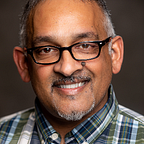Mathematics Has A History Of A Higher Purpose; Education Has A History Of Neglecting It.
Note: I told Raya I was writing a blog about our journey. She just read the first few paragraphs. Teared up. Smiled…
Suicidal ideation.
Back in 2021, those two words on a psychologist’s report regarding Raya’s mental health evaluation entered my world. Never could I have imagined that the girl that literally skipped everywhere, sang to herself, and was nicknamed by her mother “Raya Sunshine”, was now dealing with a life-threatening health situation.
I also could not have imagined how I ended up handling it. It turns out my lifetime immersion in a world of mathematics gifted me a way of leaning into the situation calmly and logically — while still processing all the parental emotions of grief, sadness, and empathy.
I also didn’t know I was doing that, until I came across this article in August, 2022.
In a cruel twist of fate, mathematics was giving me a way of coping with Raya’s condition that, frankly, was impossible to explain to anyone. Yet, mathematics — school mathematics — was also partially responsible for aiding in her severe anxiety and depression. She got a D in grade 8 math because she missed most of it due to her mental health.
The best case scenario — the only case I imagined with a hopeful outcome — was that Raya would be alive for high school. In no way would high school be a balm. In fact, I only imagined it would make things worse with the testing pressures.
I just wanted her to make it to high school. Her success with mathematics was completely irrelevant to me.
The next part of the story is a happy ending that even Disney might find incredible.
Raya is a thriving high school student in all her subjects. She also plays rugby, badminton, and cricket.
Yes, you read that right. All. Which means this must include mathematics. But, it goes beyond that, and is probably the reason that Dr. Gina Cherkowski, Director of Research and Innovation at Headwater Learning Foundation, reached out to me.
You see, Raya is not only doing amazing in mathematics, she has developed a deep love and understanding for algebra — a secret wish I had for both my kids. The girl who started high school with a shaky foundation of grade 8 math and lingering effects of anxiety/depression like self-doubt, lack of confidence, etc., is now fully fluent in all of high school algebra.
Solving systems. General solutions. Matrices. Done, done, and done.
Those against the California Framework — and Jo Boaler — are probably only applauding all this for the learning status of algebra — that the career doors for Raya are enhanced by such success.
While Raya is showing interest in an astronomy field, I couldn’t care less about that. If she wanted to open up a bakery, her understanding of algebra transcends career choices.
Algebra is giving life to her. It, like listening to Beach House, Pink Floyd, and The Gathering, is a place of restorative energy. She is choosing algebra as a place of self-care.
That choice, sadly, is an anomaly as a potential purpose of mathematics. Even though it has been present in some of the darkest crevices of life — Ramanujan(death bed), Tetsuya Miyamota, creator of KenKen(suicidal ideation), Christopher Jackson(incarceration), and Ivan Moscovich(concentration camps) — mathematics education has never interlaced these life-altering/life-saving purposes in school.
Just look at the current climate of discussion.
Renewed attacks on Jo Boaler and The California Math Framework from elitist gatekeepers who only mathematics as a currency for a higher status in society.
The neverending saga of “Back to Basics” elbowing its way into math conversations, debates, and wars. The people who lead the charge are generally white, males — drowning in the demand for direct instruction and overbaked intimacy with the times tables.
Fluency. While this is a pertinent topic. The way that it is being positioned and discussed is low-hanging fruit, limited to only factual, procedural, and conceptual fluency. To learn language in the most robotic and disinteresting ways. What about historical and contemporary fluency?
The end result is that — in a tragedy that Shakespeare might have penned — that few are actually talking about mathematics. How is that possible? Well, everyone seems to be talking about and around mathematics, but few are talking about it. First of all, do you see any educators critiquing the content? Nope. But, there is a lineup a mile long in terms of how mathematics should be taught.
Let me frame this another way. Imagine a conversation going on with a whole bunch of people for hours talking about how powerful and beautiful music is — without mentioning any artists, bands, albums, or songs? Ridiculous, right?
Well, that’s been going for years in mathematics education — primarily because we have no interest in questioning the content. Fractions, factoring, trigonometry, and calculus. Isn’t that it? Well, it might be, if one has no interest in the history of mathematics and its thematic development, and primarily uses the mathematics — and its low-value utilty purposes — that would be metaphorically found at a Sunday Flea Market.
Mathematics has a power of hope and healing that is available to anyone. I am reminded of my favorite Kafka quote. Just replace “Life” with “Mathematics”…
Mathematics’ splendor came for me and my daughter. Mathematics education must priortize it coming for all.
